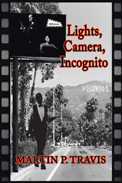
 |
In 1929, Abel finishes college in Tuskegee, Alabama, and leaves his sharecropper father's home and its brutal history of racist hate crimes and murder to fulfill his dream of writing in New York. However, a mistake soon sends him fleeing, and he spends nearly two decades exiled in Hollywood in the domestic service and sometimes amorous embrace of a Hollywood writer and his beard of a wife. Over the years, as fortunes and times change, all three face the costs of the cutthroat, fickle, and politicized film industry, leading to tragedy, loss, and new paths. The road leads Abel back to Harlem, where he builds a family and a theater career as a playwright and producer. Still, the times follow him, and he must remain nimble and ambitious as he chooses his future.
This sweeping novel spans more than twenty years. It depicts portions of modern American history through the path and perspective of the kind of character often underrepresented in literature and history. Themes here certainly include but are not limited to racism, as the narrative also dips into provocative explorations into sexuality, creativity, and relationships. In the Hollywood that Abel adopts as his home, sex is practiced across a fluidity of gender-based attraction and is used interchangeably as a gift, currency, obligation, act of lust, demonstration of power, and ultimately, as a means to forge a family. Relationships here can likewise grow from love, but they also exist for mutual professional benefit. At his core, however, Abel has the drive of a true writer. His artist's compulsive passion and innate talent stand in stark contrast to that of his employer, a Hollywood writer for whom the written word is a commodified business product. Abel's evolution leads him to make new choices and journey further away from his roots and into history.
RECOMMENDED by the US Review